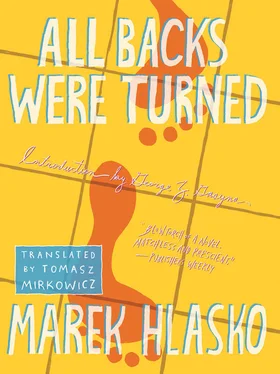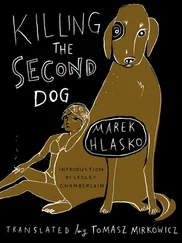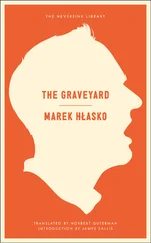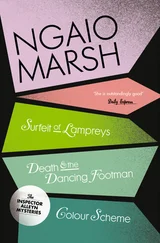The Eighth Day of the Week , an underemployed writer named Grzegorz, wrestles with the contradiction between what has been promised him of the brave new world and what has been borne out. In the end, he asks, “Can anything valuable come out of a world that has to use blackmail to keep from collapsing?” The indirect answer to his question, which he himself provides, is, “Waiter, half a liter, please.”
From 1959 until his death, Hlasko led a life of exile: his petitions to return home to Poland were ignored or rejected by the regime in Warsaw, and so he roamed around Western Europe and Israel. Soon, what had begun as youthful wanderings began to resemble an existential imperative. By consensus, Hlasko’s most intensely productive phase is the period between 1959-64, though even then, as an avowed “outsider,” he shuffled between West Germany and Israel, sometimes for reasons practical — he was married to a popular German screen actress for a time, and had many acquaintances in Israel — but frequently due to factors having to do with the impossibility of finding true peace or a true home.
The texts either dating from or inspired by this chapter in his life, such as the short novel Killing the Second Dog ( Drugie zabicie psa , available in English also from New Vessel Press), are unusually sparse, claustrophobic, oversaturated by color and light, and punctuated by images of surprising beauty which serve as a vivid counterpoint to the stark portrayals of brutality and humiliation endured by the down-and-out antiheroes. Combined with scathing irony, poignant vignettes of frailty, and an occasional wink to the reader, this semi-autobiographic world is a zone dominated by men, men who are often paired in their peregrinations so as to both complement and expose one another’s weak sides. In fact, all the protagonists of Hlasko’s oeuvre suffer from major handicaps; typically these are latent until foregrounded by inevitable conflict or are laid bare in dramatic outbursts of rare, abject honesty by the other, the companion, or by a woman who sometimes completes the triangle of interdependencies. This is a realm in which conflict is contested chiefly between men and, in an unhappily misogynistic turn, a realm in which the men are very frequently undone by (their inability to relate to) women. At the opening of the novel, co-protagonist Dov Ben Dov, a former Israeli Army officer who has fallen on hard times, is on trial yet again, this time for assault in a Tel Aviv club. When the presiding judge asks him for his name and demands that he answer whether he will plead guilty to the charges of “disrupting public order in the city of Tel Aviv on June fifth,” Dov fires right back: “No. As far as I remember, there’s never been any order in this city.” Conflict is in the very bones of Hlasko’s protagonists, and of his plots, and there are never any easy answers.
Expansive and self-congratulatory male bravado fills the entire canvas, but it becomes clear soon enough that the root cause of Dov’s misfortunes, present and future — apart from his cantankerous, narcissistic father perhaps — is his spectacularly failed marriage. All the other men in the novel, whether friends, enemies, or mere bystanders, concur on this point. “She brought him down” is the laconic assessment of one of the peripheral men in the story, as he sits in a restaurant where he’s just met with Dov. “She did,” a passing waiter nods in fatalistic agreement.
As noted above, Hlasko’s novels and shorter fiction, especially those produced in the late ’50s and early ’60s, including the work you have in your hands, are organized around two male protagonists who share the spotlight. However, readers have unequal access to their minds: one of them is typically given more attention, his internal world relatively more open to inspection, his motives less inaccessible. This figure is frequently construed in Hlasko criticism as a foil of the author himself, though any such overidentifications are risky. We often encounter the two principals while they are already on the road, in the midst of a longed-for escape from their problems, which sometimes involves their participating in some elaborate swindle or dealing with similar reversals of fortune fate has thrown their way. These two men are fellow travelers, and to some extent share a destiny, but Hlasko also posits them as rivals. Yet, while they despise significant elements of each other’s personalities, they desperately need one another — much the same way as Beckett’s characters in Endgame or Waiting for Godot depend on one another’s presence even as they abhor it. This picaresque convention, the idea of setting out on the road with a companion, constitutes a time-honored literary paradigm in the Western canon. Hlasko borrows liberally from this convention, but further sharpens his encounters “between men” through the cinematic twist of extreme close-ups, abrupt perspectival changes, and the deployment of recurrent objects that may foreshadow dramatic action. In All Backs Were Turned , for instance, stones play such a symbolic function, evoking — among other images — Christ’s parable on the doubtful virtue of guiltlessness and, more obliquely, the Genesis account of the contest between Cain and Abel. However, such scenarios of the friend/rival and the road do not appear in Hlasko’s fiction merely for structural convenience or pedagogical payout; rather, they recur precisely because the protagonists keep stumbling into familiar situations, yet never seem to have learned anything from last time.
They engage in pithy sarcasm and constant one-upmanship — but the situation can also turn on a dime. The stakes are deadly serious, the categories of survival starkly elemental, leaving precious little room for maneuver. And justice, here on the frontier, ends up as a cruel handmaid of forces that our protagonists, preoccupied with scraping a living, with capturing happiness if only for a fleeting moment — and thus human, all too human, tragically human — are simply unable to grasp. Wrapped up in their fragile egos, preoccupied with their dramas, their backs turned, they never see that stone coming.
George Z. Gasyna
Associate Professor of Slavic Languages
and Literatures, University of Illinois
WEARING A BLACK HAT AND A BLACK COAT, HIS mournful face surrounded by a shaggy beard, he resembled a bird from some fantastic story; one of those fairy tales you tell children so they’ll fall asleep, tales that belong to the horrors of childhood. He was sitting behind a table set up on the sidewalk in front of the courthouse; a typewriter stood before him. The man’s clients were too poor to afford a real lawyer, yet he was no worse than any lawyer in this city. He knew how to write all sorts of complaints, petitions, and appeals, no matter whether the case had to do with alimony or a car accident, and he knew beforehand what the verdict would be. He could also supply witnesses of all kinds, ranging from innocent-eyed youths who just happened to be walking down the street when the accident occurred and saw everything that took place — or rather what, two months or even a year later, he told them they’d seen — to distinguished old men nobody would dare accuse of lying.
He adjusted his hat; rivulets of sweat were trickling down his neck, and the client fidgeted nervously. A clean sheet of paper had been inserted into the typewriter fifteen minutes ago, but so far the bird hadn’t written a word.
“Does my case look bad?” the client asked.
“No,” the blackbird said. “Everything is going to be fine.”
“I thought so,” the client said. “I want that man punished. I want him to go to jail.”
“There’ll be two trials,” the bird said. “And he’ll go to jail twice.”
Читать дальше












